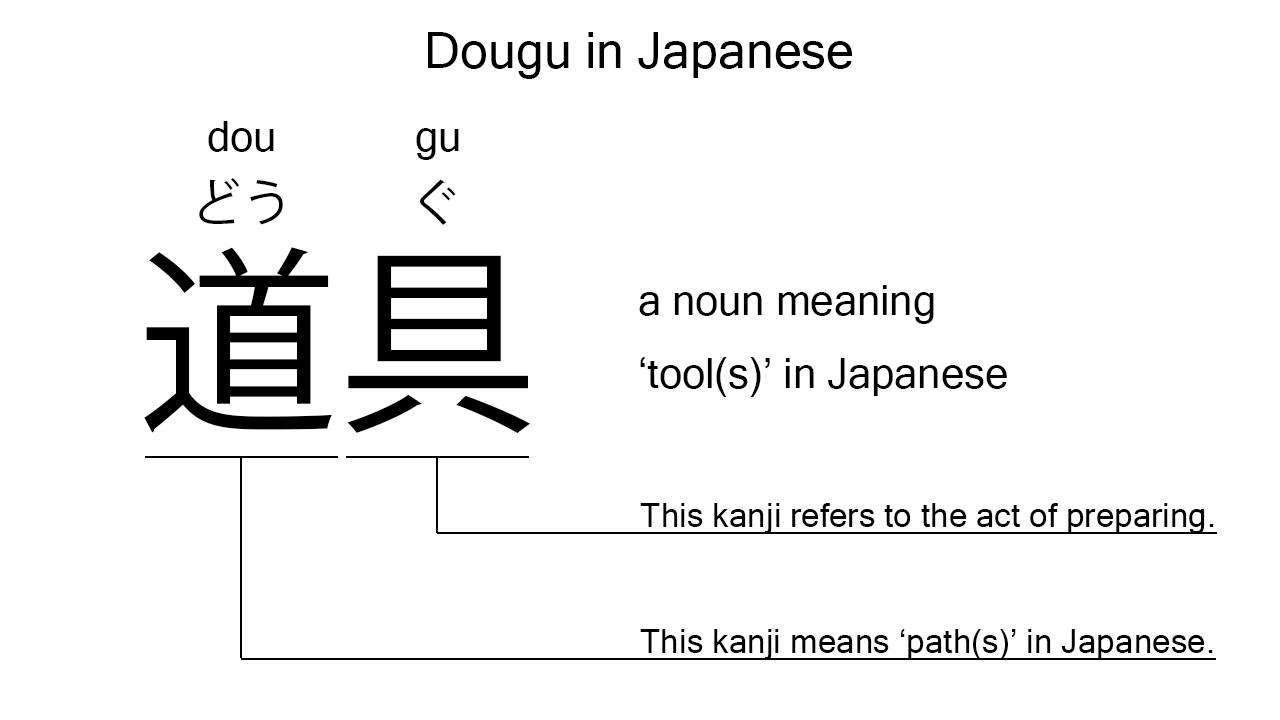What does “dougu” mean in Japanese?
Native speakers say “dougu” often to mean ‘tool’ in Japanese. Perhaps, some Japanese learners know this word as it is sometimes used in Japanese conversations. In this blog post, however, I will explain it in detail based on its kanji expression. And also, I will explain how to use it through example sentences. My explanations would help Japanese learners understand “dougu” more clearly. Then, let’s get started!
Contents
Definition and meanings of “dougu”
Let me start with the definition and meanings of “dougu”.
- dougu – 道具 (どうぐ) : a noun meaning ‘tool’, ‘gear’, or ‘equipment’ in Japanese. This can also work as plural. Learn more about Japanese plural.
Japanese native speakers use this noun to refer to something they use to get some work done. Often it can be carried around.
The definition and meanings are not that difficult, I think. To understand this noun more clearly, however, let me explain its kanji characters in detail, one by one.
What does “dougu” literally mean in Japanese?
The kanji expression of “dougu” consists of the following two kanji characters:
- 道 : a kanji character often used to mean ‘way’, ‘path’, or such in Japanese.
- 具 : a kanji character sometimes used to refer to the act of preparing, providing, or such.
From these two kanji characters, we can understand that “dougu” literally means “preparing for a path” in Japanese. This literal interpretation is not completely in line with the actual meanings, but still understandable, I think. Tools are often prepared before we go to work. It’s also worth mentioning here that the path here was originally used to refer to a religious path in the past.

When we meet new kanji expressions, we should check their kanji characters in detail to understand their meanings clearly and deeply. In many cases, kanji characters tell us a lot about the meanings of the expressions they form. Actually, here, we could get the better understanding of “dougu” through the detailed kanji check above.
So far, I’ve explained the definition and meanings of “dougu” together with its kanji characters. Then, let me explain how to use it through the example sentences below.
Example #1: how to say “tools” in Japanese
watashi wa atarashii dougu wo kat ta – 私は新しい道具を買った (わたしはあたらしいどうぐをかった)
I bought new tools.
Below are the new words used in the example sentence.
- watashi – 私 (わたし) : a pronoun meaning ‘I’ in Japanese.
- wa – は : a binding particle working as a case marker or topic marker. In the example, this works after “watashi” to make the subject in the sentence.
- atarashii – 新しい (あたらしい) : an i-adjective meaning ‘new’ in Japanese.
- wo – を : a case particle used to make the object word in a sentence. In the example, this is used after “atarashii dougu” to make the object in the sentence.
- kat – 買っ (かっ) : one conjugation of the verb, “kau“, which means ‘to buy’ in Japanese. In the example, it has been conjugated for the better connection with its following word.
- ta – た : an auxiliary verb used after a verb, adjective, or auxiliary verb to make its past tense form. In the example, this is used after “kat” to make its past tense form, “kat ta”.
This is a typical usage of “dougu”. In this example, it works together with the i-adjective, “atarashii”, to mean ‘new tools’ in Japanese.
Example #2: another usage of “dougu”
dougu wa totemo takakat ta – 道具はとても高かった (どうぐはとてもたかかった)
The tools were very expensive.
Below are the new words used in the example sentence.
- totemo – とても : an adverb of degree meaning ‘very’, ‘much’, ‘so’, or such in Japanese.
- takakat – 高かっ (たかかっ) : one conjugation of the i-adjective, “takai“, which means ‘expensive’ or ‘high’ in Japanese. In the example, it has been conjugated for the better connection with its following word.
This is another typical usage of “dougu”. In this example, it works together with the binding particle, “wa”, to become the subject in the sentence. When we want to refer to a tool or tools in Japanese, anyway, this noun is always a very good option.
Summary
In this blog post, I’ve explained the definition and meanings of “dougu” in detail based on its kanji expression. And also, I’ve explained how to use it through the example sentences. Let me summarize them as follows.
- dougu – 道具 (どうぐ) : a noun meaning ‘tool’, ‘gear’, or ‘equipment’ in Japanese. This can also work as plural. These two kanji characters literally mean “preparing for a path” in Japanese. This literal interpretation is not completely in line with the actual meanings, but still understandable, I think. Tools are often prepared before we go to work. It’s also worth mentioning here that the path here was originally used to refer to a religious path in the past.
Hope my explanations are understandable and helpful for Japanese learners.
Leave a Reply